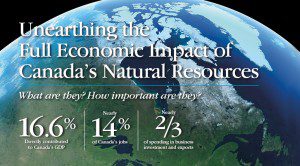 New analysis finds resources contribute $260 billion to the economy, account for nearly two-thirds of investment and exports
New analysis finds resources contribute $260 billion to the economy, account for nearly two-thirds of investment and exports
OTTAWA, May 28, 2015 – While many pundits fret about the Canadian economy’s overreliance on natural resources, particularly during a time of volatile oil prices, there is in fact little agreement even on which industries constitute natural resources. A new report by Macdonald-Laurier Institute Senior Fellow Philip Cross contributes a rigorous new definition of what natural resources are, then demonstrates exactly how much “hewing wood” and “drawing water” contribute to the economy. The result is that natural resources contribute even more to the Canadian economy than previously understood, and, contrary to assertions that Canada must “diversify” its economy, this is a good thing.
In 2010, natural-resource industries contributed $260 billion to the national economy – about 16.6 per cent of GDP. The report also shows that each dollar of increased resource output contributes $2.32 of economy-wide GDP.
“Only by embracing our rich endowment and history of natural resources will Canada extract their full value”, Cross writes.
To read the paper, titled “Unearthing the Full Economic Impact of Canada’s Natural Resources: What are they? How important are they?”, click here.
 Natural resources are enormously important to business investment in Canada, the analysis shows. In 2013, Cross finds, they accounted for $144.5 billion – 61 percent – of all business investment in plant and equipment.
Natural resources are enormously important to business investment in Canada, the analysis shows. In 2013, Cross finds, they accounted for $144.5 billion – 61 percent – of all business investment in plant and equipment.
“Since business investment has leaned so heavily in developing our natural-resource base in recent years, resources are destined to play a key role in Canada’s economy for decades to come”, Cross writes.
Cross’ paper makes a number of other key findings:
- Resources and services are closely interrelated: Many observers miss this connection, but Cross finds that the largely-urban based business and financial services and transportation sectors see a sizeable increase in demand as output grows in the resource sector.
- The impact of recessions on resources is different: In many sectors, such as housing or manufacturing, producers respond to a slowdown in business by producing less. Not so with resources. Resource developers instead adjust to downturns by lowering prices. This is because most of the cost of developing natural resources is done at the start of a particular development (such as a mine), making it comparatively less expensive to go on extracting it even when demand drops.
- Resources contribute slightly less to total employment than to output: While resources contribute 16.6% of GDP, about 14 per cent of workers are employed in the resource sector. Cross notes this is because the industry is very capital-intensive.
Part of the problem with properly analysing the impact of resources in the past has been an absence of agreement on what industries should be included. Various institutions and reports all have different ways of measuring resource staples.
Cross proposes a definition that includes all of the primary industries, including utilities. It then adds industries that rely on resources for greater than 17 per cent of their inputs, which includes such sectors as primary metal manufacturing, pulp and paper manufacturing, and pipeline transport.
***
Philip Cross is a Senior Fellow with the Macdonald-Laurier Institute. He previously served as the Chief Economic Analyst for Statistics Canada, part of a 36-year career with the agency.
The Macdonald-Laurier Institute is the only non-partisan, independent national public policy think tank in Ottawa focusing on the full range of issues that fall under the jurisdiction of the federal government. Join us in 2015 as we celebrate our 5th anniversary.
For more information, please contact Mark Brownlee, communications manager, at 613-482-8327 x105 or email at mark.brownlee@macdonaldlaurier.ca.




